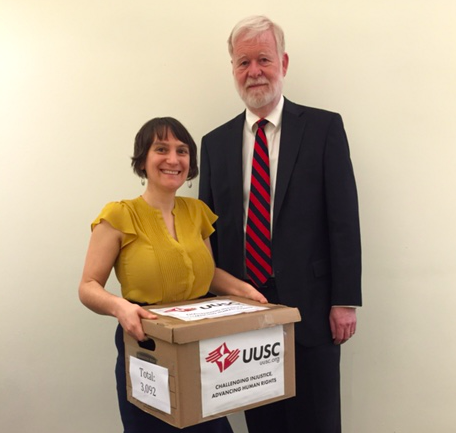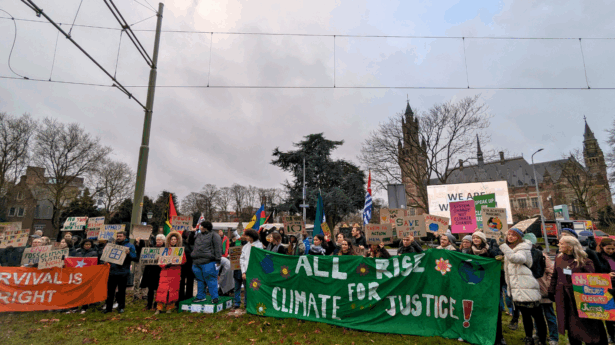The Unitarian Universalist Service Committee advances human rights through grassroots collaborations.
Another Step in Our Struggle to Champion the Human Right to Water

April 26, 2016
“In Detroit alone, 64,000 residents lived without water due to shutoffs in 2015. No one was spared – kids, elderly, or disabled. Another round of 400 to 500 shut offs per week is scheduled to begin this month.” – Maureen Taylor, Michigan Welfare Rights Organization, as part of her testimony at the Inter-American Commission on Human Rights
On April 4, 2016, I traveled to Washington, D.C. to attend a hearing at the Inter-American Commission on Human Rights (IACHR) about water poisoning, water shutoffs, and water prices. UUSC and several of our grassroots partners came to hold the United States government accountable for its failure to adequately protect the human right to water within our own borders. Members of the U.S. Human Rights Network’s National Right to Water and Sanitation Coalition called for a hearing by this international commission because the U.S. has repeatedly denied the existence of any federal law guaranteeing the human right to water.
Among those who testified was Horacio Amezquita of San Jerardo, Calif., who talked about the injustices his community has faced: “I’m from a farmworker community where the ground aquifers are contaminated by fertilizers and pesticides. Instead of cleaning it, the government tried to evict us. We fought and won the right to stay, but now the cost of water has increased by 500%….In my state, 2 million people don’t have access to safe, clean water. We organized and California passed the first Human Right to Water law in the United States, but there is still much to be done.”
Catherine Flowers of the Alabama Center for Rural Enterprise (ACRE) spoke of communities that lack the basic water and sanitation infrastructure that most people in the U.S. take for granted. “I’m from Lowndes County, Alabama. We are a stark example of inequality. Black kids in my hometown are living and playing around raw sewage. Families who can’t afford a septic system that costs $16,000 are criminalized and fear arrest.”
Thu Tran of Community Legal Services, Philadelphia, Penn., summed up the coalition’s recommendations: “We need a National Water Affordability Standard. People risk losing their homes and even their kids because they can’t afford their water bills.”
The U.S. Department of State was present and required to reply, but they focused their response on U.S. funding for international aid, failing to address the comments of their own citizens who testified. The head of the Commission, Margarette Macaulay from Jamaica, issued a strong response. “With all the United States does to help water access globally, can’t you do the same thing here? It really blows my mind, quite frankly. If you ignore your most vulnerable, you are not a civilized society.”
My last stop in D.C. was the Environmental Protection Agency’s Office of Water, where I met with Jeff Peterson, Senior Policy Advisor on Climate Adaptation. I delivered letters from over 3,000 supporters calling on the EPA and the White House to include water affordability and safety in the national climate adaptation plan. Water bills around the U.S. have risen an average of 40% over the past 5 years[1], and they will continue to rise due to the effects of climate change unless something is done now.
The EPA acknowledged that the rise in the cost of clean water and sanitation is a serious problem, and that it is “still learning” about the discriminatory impact of unaffordability and home water shut-offs on communities of color and low-income households. UUSC and our members are doing our part to ensure that they know these issues are a priority for the all U.S. citizens.
This trip was another step in UUSC’s long struggle to champion the human right to water – in the United States and throughout the world. Look for our report on water unaffordability, “America’s Invisible Drought,” coming this May!
[1] http://www.circleofblue.org/2015/world/price-of-water-2015-up-6-percent-in-30-major-u-s-cities-41-percent-rise-since-2010/

